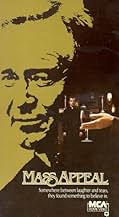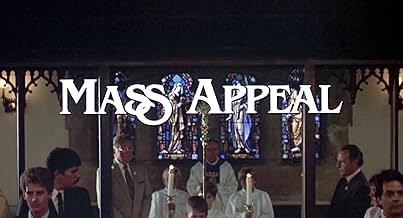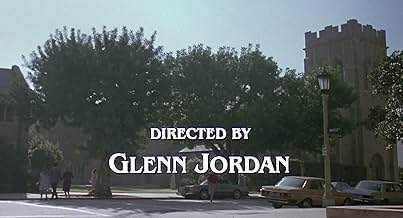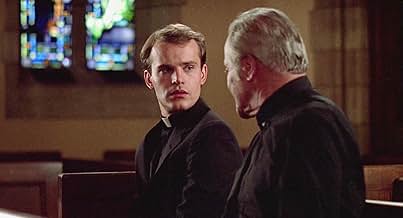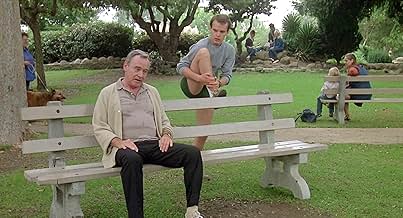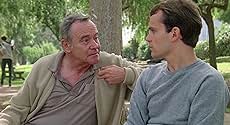IMDb-BEWERTUNG
6,7/10
1186
IHRE BEWERTUNG
Füge eine Handlung in deiner Sprache hinzuA popular Connecticut priest shields a seminary rebel from the wrath of a stern monsignor.A popular Connecticut priest shields a seminary rebel from the wrath of a stern monsignor.A popular Connecticut priest shields a seminary rebel from the wrath of a stern monsignor.
- Auszeichnungen
- 1 wins total
Empfohlene Bewertungen
Pity the poor congregation of St. Francis Parish, subject to "dialogue sermons" (what???), autobiographical psycho-babble and in the end, self-righteous calls to rise up against the local Church hierarchy. If things are really like this in the Catholic Church today, its enough to make this lapsed Catholic stay that way for a long time. That said, and hoping that this does not mirror reality, the movie works as entertainment, largely due to the performances of the two main characters. Jack Lemmon is delightful and convincing as a lonely priest who has found strategies (some decent ones, some hurtful) to survive who takes on the task of mentoring and tempering the well-meaning but naive passions of a young seminarian, also well played. The big casualty is in the one-dimensionality of the "heavy" played by Charles Durning, and perhaps of all of his cronies as well. Well, Catholic bashing is nothing new, mostly by ex-Catholics, but it always diminishes the dialogue such issues could provoke. However, there is more to the movie than this, especially in some very good characterizations of Catholic lay people, Louise Latham's housekeeper in particular.
Last night we showed `Mass Appeal' at our parish's monthly Movie Night - REEL Conversations. There was a mixed reaction from the viewers and some lively discussion afterwards.
Some questioned why Hollywood has trouble portraying Catholics (priests, monsignors, laity) in a positive light. We had difficulty coming up with a movie that showed a believer acting like a true believer. In this film, for example, in times of crisis or need, the characters don't turn to prayer for God's help. Seemed odd.
We very much enjoyed the dialog between the mentor priest and young seminarian. It was interesting to see the roles of the two alternate throughout the movie. Plenty of still-pertinent topics they covered (authority of the church, power, homosexuality, celibacy, sin, being lukewarm in one's faith) with some very interesting outcomes.
All in all, an enjoyable film with moments of great humor and warm sentiment. A fine choice for a group discussion. One that challenges your faith and is encouraging to those who believe.
Some questioned why Hollywood has trouble portraying Catholics (priests, monsignors, laity) in a positive light. We had difficulty coming up with a movie that showed a believer acting like a true believer. In this film, for example, in times of crisis or need, the characters don't turn to prayer for God's help. Seemed odd.
We very much enjoyed the dialog between the mentor priest and young seminarian. It was interesting to see the roles of the two alternate throughout the movie. Plenty of still-pertinent topics they covered (authority of the church, power, homosexuality, celibacy, sin, being lukewarm in one's faith) with some very interesting outcomes.
All in all, an enjoyable film with moments of great humor and warm sentiment. A fine choice for a group discussion. One that challenges your faith and is encouraging to those who believe.
Father Farley drinks a little. He also goes to the races, is bad with first names, and tells "little lies" to get him out of tricky situations, like those involving domestic quarrels and slideshows with Monsignor Burke. But his parish loves him. Then he is assigned to look after a passionate young deacon who challenges him to step out of his blissful rut.
Jack Lemmon gives a very lived-in, often moving performance as Father Farley, and the best moments of "Mass Appeal" give us a chance to see Lemmon in his seriocomic element. But the film as a whole feels less smooth. Though it raises questions about saying what one believes versus being popular, "Mass Appeal" struggles to find a balance of its own, whether it wants to be a Neil Simon-style light comedy or a searing examination of the Catholic Church today.
Still, "Mass Appeal" is more good than not. It deals knowingly with the concepts of Catholicism, and hones in on the charms and pitfalls of the parochial life with small-bore detail. "Did I tell you about the coughs?" Father Farley tells the deacon, Mark Dolson (Zeljko Ivanek), cluing him in on one of the telltale signs a sermon-giver is losing his congregation. When giving a sermon, never say "you," always say "we." Less confrontational that way.
The problem is that Dolson is all about confrontation. He already has Monsignor Burke (Charles Durning) fuming about being called a "homophobic autocrat" for kicking out a pair of seminarians suspected of sleeping together. Dolson speaks in favor of the ordination of women, tells Farley he'd be a better priest if he drank less, and calls out the congregation during one sermon for their mink hats and blue hair.
Farley squirms from his seat behind the altar while his acolyte implodes in the pulpit, ignoring his hacking throng. "We'll be going out the back today," he mutters to an altar boy in a classic Lemmon aside.
My main problem with "Mass Appeal," as noted by other posters, was that I was never sold on Dolson's reason for becoming a priest. He seems more like a mouthpiece for Bill C. Davis, adapting his Broadway play, to vocalize his concerns about the church's position on wedge issues like celibate gays in the clergy. Ivanek plays him as a character who acts more from anger than conviction, which seems a wrong choice. You don't have to be an autocratic homophobe to think this guy, celibate or not, will have problems with his priestly office somewhere down the road.
There's a frostiness to Ivanek's scenes with Lemmon that's off-putting, and the sentiment squeezed out of them sometimes feels stagey and forced. Director Glenn Jordan worked mostly in TV movies, and while he frames his scenes well and builds a good pace, there's often a pedestrian quality to the overall presentation. You can't stick in a car chase with a film like this, but there are too many talking-head shots.
The best parts of the movie are Lemmon's scenes with Monsignor Burke, which Durning invests with his typical mix of menace and affability. Not just a heavy, Durning plays him as a bit lost. Burke really likes Farley but alienates him at the same time with his bullying, as subservience is the only kind of devotion this sacerdotal relic understands. When Dolson calls him out on his harshness, Burke targets him for his frankness and justifies his vendetta as churchly devotion.
One wishes Davis made Burke more than the bad guy, perhaps found a way to make him a more active player in the spiritual journeys of Farley and Dolson, journeys left largely unexplored here. Instead he's made the object of anger for the other characters, and even has a wormy henchman on call. Didn't Burke have his days as a lost seminarian, too?
"Mass Appeal" gets by with its light charm, its probing and atypical focus on the Catholic faith in practice, and most especially Lemmon's strong central performance. Even if you don't like Lemmon in every film of his you see, it's safe to say you will like him here. Sometimes it takes a lesser film to display a great actor, and that's what you get here.
Jack Lemmon gives a very lived-in, often moving performance as Father Farley, and the best moments of "Mass Appeal" give us a chance to see Lemmon in his seriocomic element. But the film as a whole feels less smooth. Though it raises questions about saying what one believes versus being popular, "Mass Appeal" struggles to find a balance of its own, whether it wants to be a Neil Simon-style light comedy or a searing examination of the Catholic Church today.
Still, "Mass Appeal" is more good than not. It deals knowingly with the concepts of Catholicism, and hones in on the charms and pitfalls of the parochial life with small-bore detail. "Did I tell you about the coughs?" Father Farley tells the deacon, Mark Dolson (Zeljko Ivanek), cluing him in on one of the telltale signs a sermon-giver is losing his congregation. When giving a sermon, never say "you," always say "we." Less confrontational that way.
The problem is that Dolson is all about confrontation. He already has Monsignor Burke (Charles Durning) fuming about being called a "homophobic autocrat" for kicking out a pair of seminarians suspected of sleeping together. Dolson speaks in favor of the ordination of women, tells Farley he'd be a better priest if he drank less, and calls out the congregation during one sermon for their mink hats and blue hair.
Farley squirms from his seat behind the altar while his acolyte implodes in the pulpit, ignoring his hacking throng. "We'll be going out the back today," he mutters to an altar boy in a classic Lemmon aside.
My main problem with "Mass Appeal," as noted by other posters, was that I was never sold on Dolson's reason for becoming a priest. He seems more like a mouthpiece for Bill C. Davis, adapting his Broadway play, to vocalize his concerns about the church's position on wedge issues like celibate gays in the clergy. Ivanek plays him as a character who acts more from anger than conviction, which seems a wrong choice. You don't have to be an autocratic homophobe to think this guy, celibate or not, will have problems with his priestly office somewhere down the road.
There's a frostiness to Ivanek's scenes with Lemmon that's off-putting, and the sentiment squeezed out of them sometimes feels stagey and forced. Director Glenn Jordan worked mostly in TV movies, and while he frames his scenes well and builds a good pace, there's often a pedestrian quality to the overall presentation. You can't stick in a car chase with a film like this, but there are too many talking-head shots.
The best parts of the movie are Lemmon's scenes with Monsignor Burke, which Durning invests with his typical mix of menace and affability. Not just a heavy, Durning plays him as a bit lost. Burke really likes Farley but alienates him at the same time with his bullying, as subservience is the only kind of devotion this sacerdotal relic understands. When Dolson calls him out on his harshness, Burke targets him for his frankness and justifies his vendetta as churchly devotion.
One wishes Davis made Burke more than the bad guy, perhaps found a way to make him a more active player in the spiritual journeys of Farley and Dolson, journeys left largely unexplored here. Instead he's made the object of anger for the other characters, and even has a wormy henchman on call. Didn't Burke have his days as a lost seminarian, too?
"Mass Appeal" gets by with its light charm, its probing and atypical focus on the Catholic faith in practice, and most especially Lemmon's strong central performance. Even if you don't like Lemmon in every film of his you see, it's safe to say you will like him here. Sometimes it takes a lesser film to display a great actor, and that's what you get here.
I consider this film to be a real little gem -- unlike the original Broadway production. Its premises ring true and the ensemble acting is superb. Lemmon and Ivanek are extremely well matched as lost or submerged parts of the other in this cautionary tale about mainstream religion straining at the limits of its ability to accommodate and hold accountable truths found in the "wider" world. Lemmon's performance, especially, is artless and memorable, avoiding sentimentality and undue predictability. It is most unfortunate that in the days after Lemmon's death that no reviewer of his oeurve decided to cite this film or show clips from it in describing the actor's versatility and "every-manness." It should not be missed; so compelling is the uneasy and finally transformative relationship between the two men that one is left wondering what happens to both priest and seminarian in the years that follow. Rent this of a Sunday afternoon when you're longing to experience some rising spirit.
The Catholic Church is as much, if not more, political than it is spiritual. As a young Catholic boy considering the priesthood yet conflicted between my own feelings and myself and that which the Church demanded, in the end I decided to go to high school instead of entering the Seminary.
I saw this movie as a young lay man. There was such a resonance for me as a Catholic and as a young man struggling with the Church, sexuality, and spirituality.
The pastor (Lemmon) was very much the pastor of a parish that was part of my experience. As much as he was devoted to his calling, he was also responsible for the political games that are played in everyone's life. The young seminarian (Ivenek) was honest, open and young with new ideas; everything the Church wanted to suppress.
The pastor wanted nothing more than to continue his comfortable position in his parish. He was assigned a new priest-to-be who had shown himself to be a bit of a radical at the seminary. It's not to be ignored the "office politics" that were in place in the assignment.
The elder was being punished and tested, so to speak, with the assignment of this younger priest. He did his best to impose his wisdom on the younger; but the younger sought spirituality more than acceptance of the status quo. In other words, he ruffled parishioners' feathers.
When complaints were lodged about this young radical priest, his sexuality came into question. What those "powers that be" were concerned about was this young priest's sermons and indictments of false spirituality dressed up as devotion. After all, if the Church had ever really been concerned with sexuality, there'd not have been a molestation of any alter boy.
This film shows how the Church picks and chooses who to persecute. Persecution of the parish priest for not playing the political games, persecution of the young seminarian who desires to spread the Word of God.
It also indicts us as parishioners. Do we go to church to be told what we want to hear or are we there to hear God's truth? Should our contributions to the collection plate influence what we hear; or should the Word of God actually mean something? This is a memorable movie in that it makes us think about what brings us to Church.
I saw this movie as a young lay man. There was such a resonance for me as a Catholic and as a young man struggling with the Church, sexuality, and spirituality.
The pastor (Lemmon) was very much the pastor of a parish that was part of my experience. As much as he was devoted to his calling, he was also responsible for the political games that are played in everyone's life. The young seminarian (Ivenek) was honest, open and young with new ideas; everything the Church wanted to suppress.
The pastor wanted nothing more than to continue his comfortable position in his parish. He was assigned a new priest-to-be who had shown himself to be a bit of a radical at the seminary. It's not to be ignored the "office politics" that were in place in the assignment.
The elder was being punished and tested, so to speak, with the assignment of this younger priest. He did his best to impose his wisdom on the younger; but the younger sought spirituality more than acceptance of the status quo. In other words, he ruffled parishioners' feathers.
When complaints were lodged about this young radical priest, his sexuality came into question. What those "powers that be" were concerned about was this young priest's sermons and indictments of false spirituality dressed up as devotion. After all, if the Church had ever really been concerned with sexuality, there'd not have been a molestation of any alter boy.
This film shows how the Church picks and chooses who to persecute. Persecution of the parish priest for not playing the political games, persecution of the young seminarian who desires to spread the Word of God.
It also indicts us as parishioners. Do we go to church to be told what we want to hear or are we there to hear God's truth? Should our contributions to the collection plate influence what we hear; or should the Word of God actually mean something? This is a memorable movie in that it makes us think about what brings us to Church.
Wusstest du schon
- WissenswertesAccording to actor Zeljko Ivanek, the fish sermon scene was shot 15 times from three different angles. Although Ivanek considers the last take the best, most of it didn't make the final cut because it was too emotionally jarring for the audience.
- Zitate
Father Tim Farley: You're a lunatic! And Christ NEEDS lunatics. But the trouble with lunatics is, they don't know how to survive.
- Crazy CreditsThis picture is dedicated to the memory of Ray A. Kroc.
- VerbindungenFeatured in At the Movies: Dune/Starman/Mass Appeal/Runaway (1984)
Top-Auswahl
Melde dich zum Bewerten an und greife auf die Watchlist für personalisierte Empfehlungen zu.
- How long is Mass Appeal?Powered by Alexa
Details
- Erscheinungsdatum
- Herkunftsland
- Sprache
- Auch bekannt als
- Mass Appeal
- Drehorte
- Claremont, Kalifornien, USA(myself, as I was an extra in this film)
- Produktionsfirmen
- Weitere beteiligte Unternehmen bei IMDbPro anzeigen
Box Office
- Budget
- 7.000.000 $ (geschätzt)
- Bruttoertrag in den USA und Kanada
- 1.945.658 $
- Weltweiter Bruttoertrag
- 1.945.658 $
Zu dieser Seite beitragen
Bearbeitung vorschlagen oder fehlenden Inhalt hinzufügen


